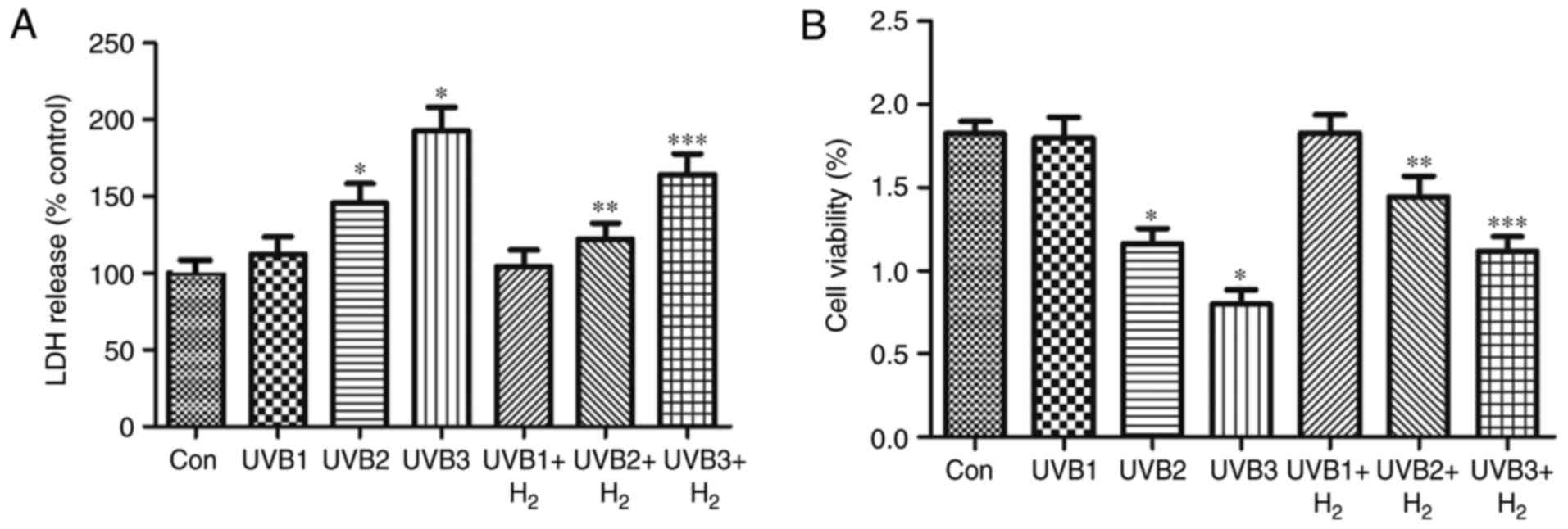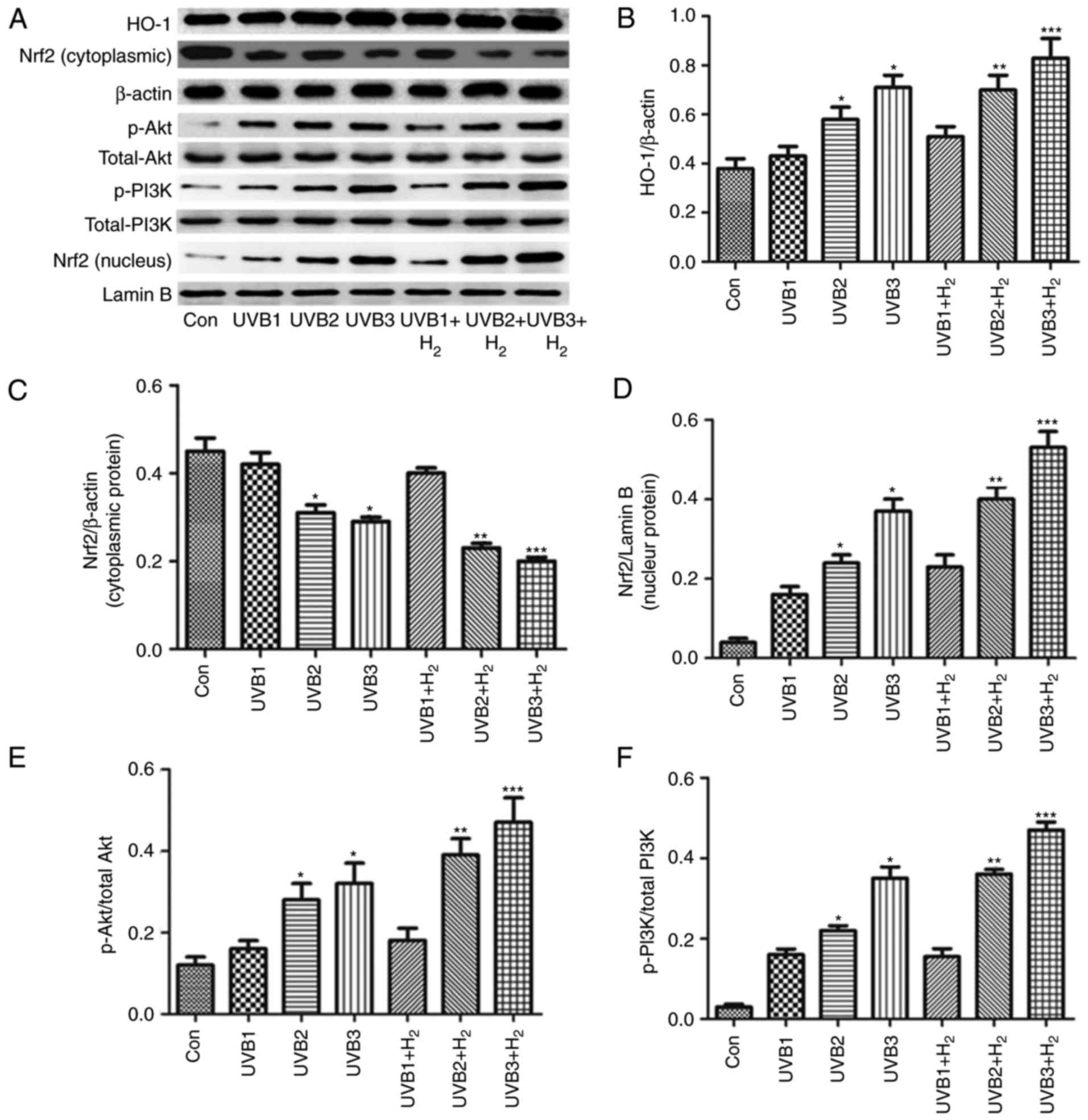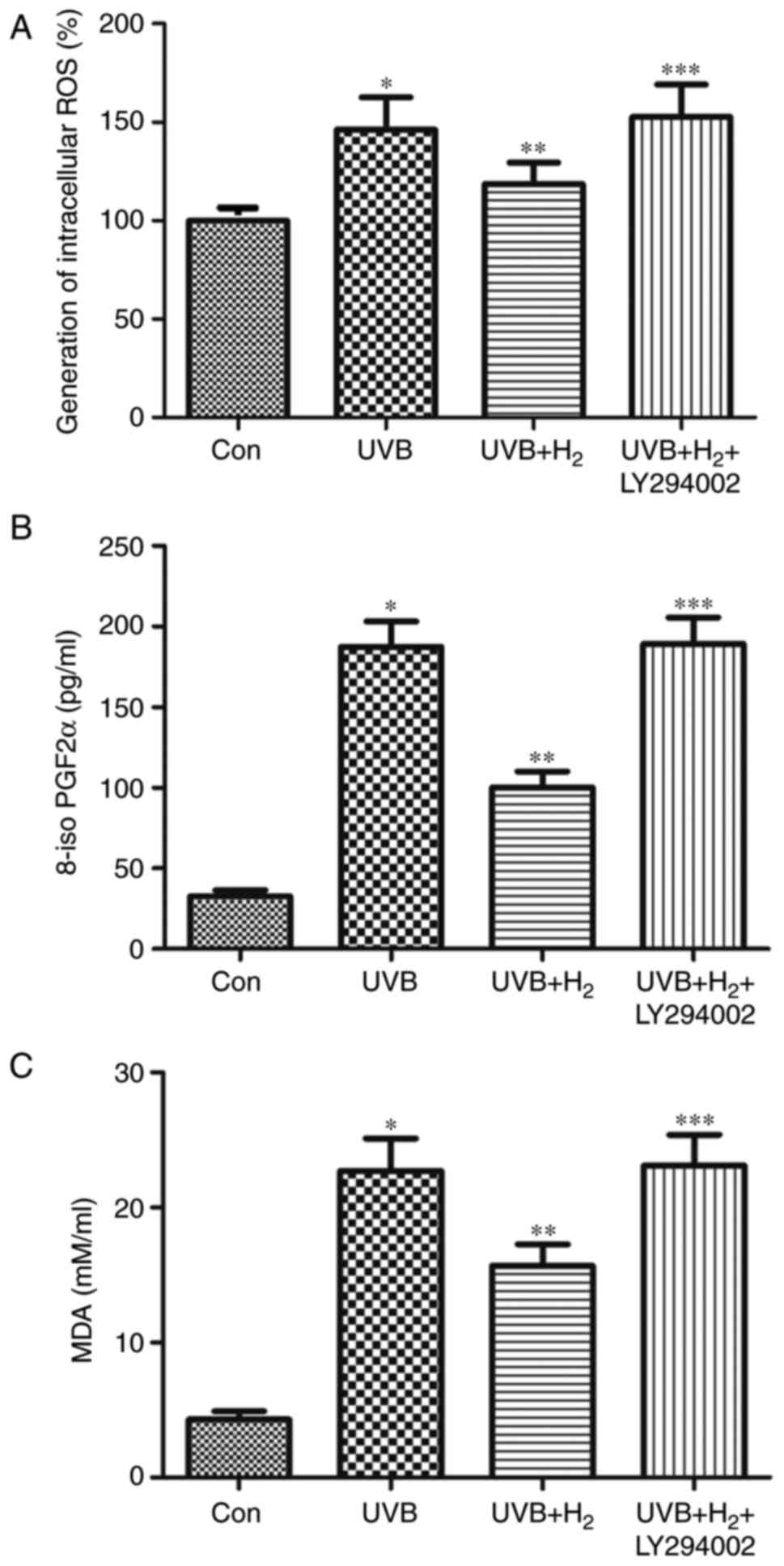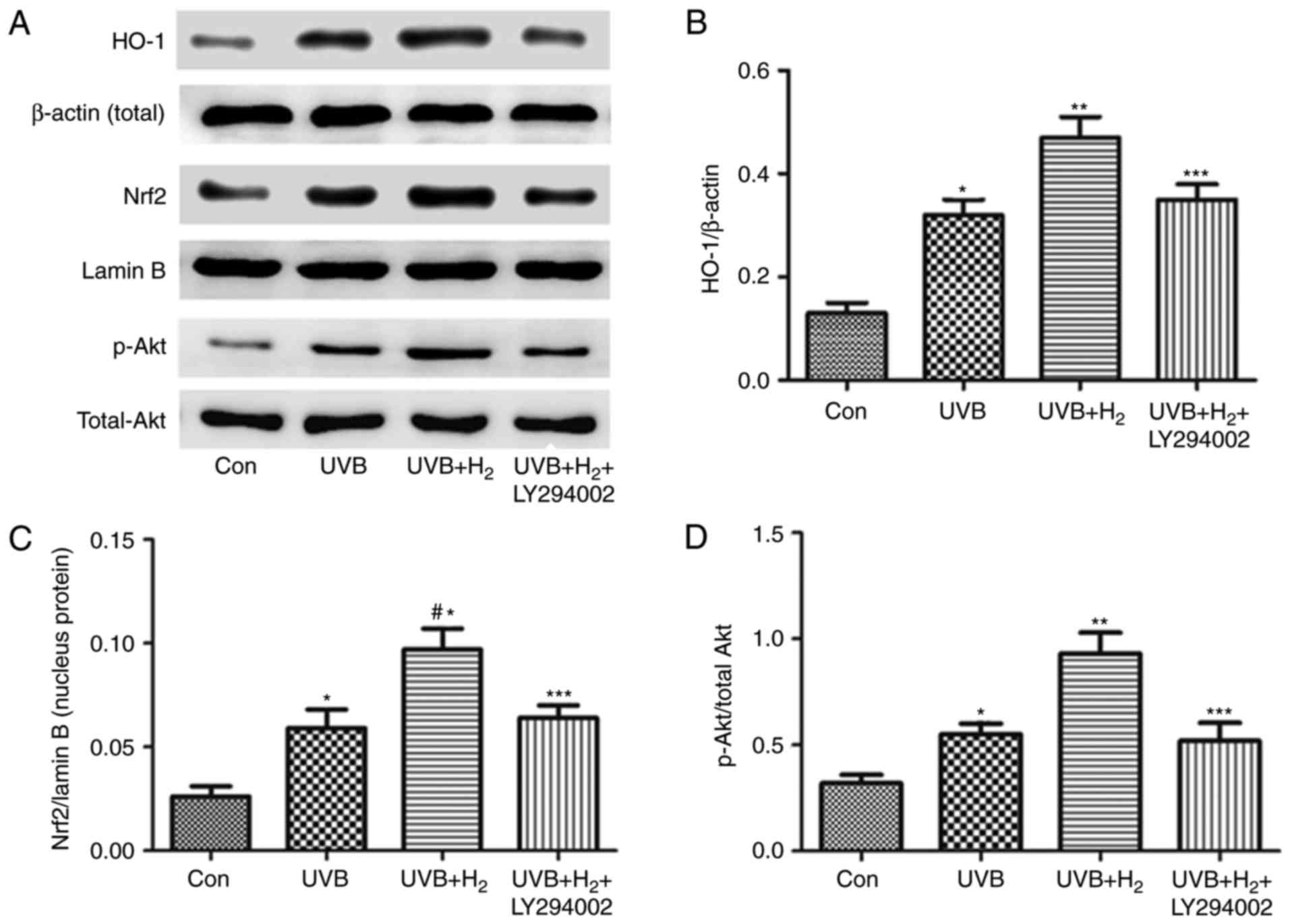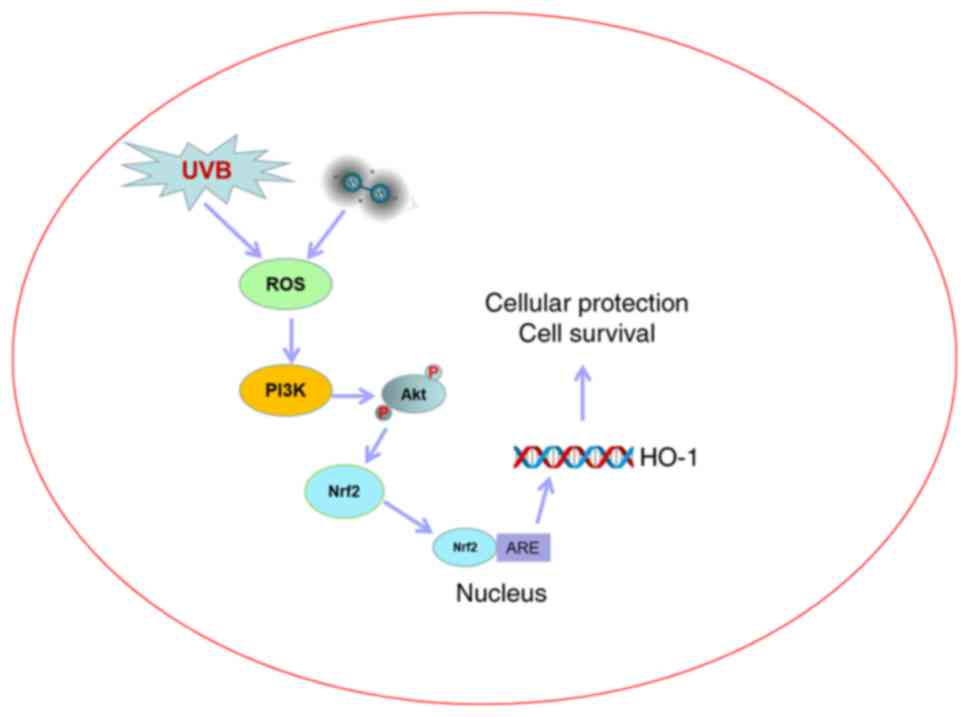|
1
|
Sharma SD and Katiyar SK: Dietary grape
seed proanthocyanidins inhibit UVB-induced cyclooxygenase-2
expression and other inflammatory mediators in UVB-exposed skin and
skin tumors of SKH-1 hairless mice. Pharm Res. 27:1092–1102. 2010.
View Article : Google Scholar : PubMed/NCBI
|
|
2
|
Helfrich YR, Sachs DL and Voorhees JJ:
Overview of skin aging and photoaging. Dermatol Nurs. 20:177–183;
quiz 184. 2008.PubMed/NCBI
|
|
3
|
Bernstein EF, Chen YQ, Tamai K, Shepley
KJ, Resnik KS, Zhang H, Tuan R, Mauviel A and Uitto J: Enhanced
elastin and fibrillin gene expression in chronically photodamaged
skin. J Invest Dermatol. 103:182–186. 1994. View Article : Google Scholar : PubMed/NCBI
|
|
4
|
Avila Acevedo JG, Espinosa González AM, De
Maria y Campos DM, Benitez Flores Jdel C, Hernández Delgado T,
Flores Maya S, Campos Contreras J, Muñoz López JL and García Bores
AM: Photoprotection of Buddleja cordata extract against UVB-induced
skin damage in SKH-1 hairless mice. BMC Complement Altern Med.
14:2812014. View Article : Google Scholar : PubMed/NCBI
|
|
5
|
de Gruijl FR: Photocarcinogenesis: UVA vs
UVB. Methods Enzymol. 319:359–366. 2000. View Article : Google Scholar : PubMed/NCBI
|
|
6
|
Katiyar SK: Silymarin and skin cancer
prevention: Anti- inflammatory, antioxidant and immunomodulatory
effects (Review). Int J Oncol. 26:169–176. 2005.
|
|
7
|
Sime S and Reeve VE: Protection from
inflammation, immunosuppression and carcinogenesis induced by UV
radiation in mice by topical Pycnogenol. Photochem Photobiol.
79:193–198. 2004. View Article : Google Scholar : PubMed/NCBI
|
|
8
|
Narayanan DL, Saladi RN and Fox JL:
Ultraviolet radiation and skin cancer. Int J Dermatol. 49:978–986.
2010. View Article : Google Scholar : PubMed/NCBI
|
|
9
|
Lee SJ and Park JW: Enhancement of UVB
radiation-mediated apoptosis by knockdown of cytosolic
NADP+-dependent isocitrate dehydrogenase in HaCaT cells. BMB Rep.
47:209–214. 2014. View Article : Google Scholar :
|
|
10
|
Lee KO, Kim SN and Kim YC: Anti-wrinkle
effects of water extracts of teas in hairless mouse. Toxicol Res.
30:283–289. 2014. View Article : Google Scholar
|
|
11
|
Palmer DM and Kitchin JS: Oxidative
damage, skin aging, antioxidants and a novel antioxidant rating
system. J Drugs Dermatol. 9:11–15. 2010.PubMed/NCBI
|
|
12
|
Sklar LR, Almutawa F, Lim HW and Hamzavi
I: Effects of ultraviolet radiation, visible light, and infrared
radiation on erythema and pigmentation: A review. Photochem
Photobiol Sci. 12:54–64. 2013. View Article : Google Scholar
|
|
13
|
Vayalil PK, Mittal A, Hara Y, Elmets CA
and Katiyar SK: Green tea polyphenols prevent ultraviolet
light-induced oxidative damage and matrix metalloproteinases
expression in mouse skin. J Invest Dermatol. 122:1480–1487. 2004.
View Article : Google Scholar : PubMed/NCBI
|
|
14
|
Verschooten L, Claerhout S, Van Laethem A,
Agostinis P and Garmyn M: New strategies of photoprotection.
Photochem Photobiol. 82:1016–1023. 2006. View Article : Google Scholar : PubMed/NCBI
|
|
15
|
Piao MJ, Kang KA, Kim KC, Chae S, Kim GO,
Shin T, Kim HS and Hyun JW: Diphlorethohydroxycarmalol attenuated
cell damage against UVB radiation via enhancing antioxidant effects
and absorbing UVB ray in human HaCaT keratinocytes. Environ Toxicol
Pharmacol. 36:680–688. 2013. View Article : Google Scholar : PubMed/NCBI
|
|
16
|
Tao S, Justiniano R, Zhang DD and Wondrak
GT: The Nrf2-inducers tanshinone I and dihydrotanshinone protect
human skin cells and reconstructed human skin against solar
simulated UV. Redox Biol. 1:532–541. 2013. View Article : Google Scholar : PubMed/NCBI
|
|
17
|
Schäfer M, Dütsch S, auf dem Keller U,
Navid F, Schwarz A, Johnson DA, Johnson JA and Werner S: Nrf2
establishes a glutathione-mediated gradient of UVB cytoprotection
in the epidermis. Genes Dev. 24:1045–1058. 2010. View Article : Google Scholar : PubMed/NCBI
|
|
18
|
Saw CL, Huang MT, Liu Y, Khor TO, Conney
AH and Kong AN: Impact of Nrf2 on UVB-induced skin
inflammation/photo-protection and photoprotective effect of
sulforaphane. Mol Carcinog. 50:479–486. 2011. View Article : Google Scholar : PubMed/NCBI
|
|
19
|
Kannan S and Jaiswal AK: Low and high dose
UVB regulation of transcription factor NF-E2-related factor 2.
Cancer Res. 66:8421–8429. 2006. View Article : Google Scholar : PubMed/NCBI
|
|
20
|
Zhong J and Li L: Skin-derived precursors
against UVB-induced apoptosis via Bcl-2 and Nrf2 upregulation.
Biomed Res Int. 2016.6894743:2016.
|
|
21
|
Wang L, Chen Y, Sternberg P and Cai J:
Essential roles of the PI3 kinase/Akt pathway in regulating
Nrf2-dependent antioxidant functions in the RPE. Invest Ophthalmol
Vis Sci. 49:1671–1678. 2008. View Article : Google Scholar : PubMed/NCBI
|
|
22
|
Lee YJ, Jeong HY, Kim YB, Lee YJ, Won SY,
Shim JH, Cho MK, Nam HS and Lee SH: Reactive oxygen species and
PI3K/Akt signaling play key roles in the induction of Nrf2-driven
heme oxygenase-1 expression in sulforaphane-treated human
mesothelioma MSTO-211H cells. Food Chem Toxicol. 50:116–123. 2012.
View Article : Google Scholar
|
|
23
|
Xu Y, Duan C, Kuang Z, Hao Y, Jeffries JL
and Lau GW: Pseudomonas aeruginosa pyocyanin activates
NRF2-ARE-mediated transcriptional response via the
ROS-EGFR-PI3K-AKT/MEK-ERK MAP kinase signaling in pulmonary
epithelial cells. PLoS One. 8:e725282013. View Article : Google Scholar : PubMed/NCBI
|
|
24
|
Li KR, Yang SQ, Gong YQ, Yang H, Li XM,
Zhao YX, Yao J, Jiang Q and Cao C: 3H-1,2-dithiole-3-thione
protects retinal pigment epithelium cells against Ultra-violet
radiation via activation of Akt-mTORC1-dependent Nrf2-HO-1
signaling. Sci Rep. 6:255252016. View Article : Google Scholar : PubMed/NCBI
|
|
25
|
Zhang H, Liu YY, Jiang Q, Li KR, Zhao YX,
Cao C and Yao J: Salvianolic acid A protects RPE cells against
oxidative stress through activation of Nrf2/HO-1 signaling. Free
Radic Biol Med. 69:219–228. 2014. View Article : Google Scholar : PubMed/NCBI
|
|
26
|
Rodriguez KJ, Wong HK, Oddos T, Southall
M, Frei B and Kaur S: A purified feverfew extract protects from
oxidative damage by inducing DNA repair in skin cells via a
PI3-kinase-dependent Nrf2/ARE pathway. J Dermatol Sci. 72:304–310.
2013. View Article : Google Scholar : PubMed/NCBI
|
|
27
|
Chen H, Xie K, Han H, Li Y, Liu L, Yang T
and Yu Y: Molecular hydrogen protects mice against polymicrobial
sepsis by ameliorating endothelial dysfunction via an Nrf2/HO-1
signaling pathway. Int Immunopharmacol. 28:643–654. 2015.
View Article : Google Scholar : PubMed/NCBI
|
|
28
|
Li DZ, Zhang QX, Dong XX, Li HD and Ma X:
Treatment with hydrogen molecules prevents RANKL-induced osteoclast
differentiation associated with inhibition of ROS formation and
inactivation of MAPK, AKT and NF-kappa B pathways in murine
RAW264.7 cells. J Bone Miner Metab. 32:494–504. 2014. View Article : Google Scholar
|
|
29
|
Hong Y, Shao A, Wang J, Chen S, Wu H,
McBride DW, Wu Q, Sun X and Zhang J: Neuroprotective effect of
hydrogen-rich saline against neurologic damage and apoptosis in
early brain injury following subarachnoid hemorrhage: Possible role
of the Akt/GSK3beta signaling pathway. PLoS One. 9:e962122014.
View Article : Google Scholar
|
|
30
|
Yu P, Wang Z, Sun X, Chen X, Zeng S, Chen
L and Li S: Hydrogen-rich medium protects human skin fibroblasts
from high glucose or mannitol induced oxidative damage. Biochem
Biophys Res Commun. 409:350–355. 2011. View Article : Google Scholar : PubMed/NCBI
|
|
31
|
Mei K, Zhao S, Qian L, Li B, Ni J and Cai
J: Hydrogen protects rats from dermatitis caused by local
radiation. J Dermatolog Treat. 25:182–188. 2014. View Article : Google Scholar
|
|
32
|
Ishibashi T, Ichikawa M, Sato B, Shibata
S, Hara Y, Naritomi Y, Okazaki K, Nakashima Y, Iwamoto Y, Koyanagi
S, et al: Improvement of psoriasis-associated arthritis and skin
lesions by treatment with molecular hydrogen: A report of three
cases. Mol Med Rep. 12:2757–2764. 2015. View Article : Google Scholar : PubMed/NCBI
|
|
33
|
Meng CY: Effect of hydrogen-rich saline on
allergic contact dermatitis in mice. Chin J Dermatol. 46:275–278.
2013.
|
|
34
|
Zhang BX: Hydrogen-rich liquid
down-regulates the expressions of inflammatory facmrs by
ultraviolet B-induced human HaCaT keratinocytes through the
autophagy pathway. Chin J Dermatol. 49:123–127. 2016.In
Chinese.
|
|
35
|
Xing WB, Fu GJ, Ye WJ, Qin LY, Chen HG,
Meng XY and Meng CY: Effects of hydrogen on ultraviolet B-induced
oxidative damage to skin fibroblasts. Chin J Dermatol. 46:424–426.
2013.
|
|
36
|
Chen HG, Xie KL, Han HZ, Wang WN, Liu DQ,
Wang GL and Yu YH: Heme oxygenase-1 mediates the anti-inflammatory
effect of molecular hydrogen in LPS-stimulated RAW 264.7
macrophages. Int J Surg. 11:1060–1066. 2013. View Article : Google Scholar : PubMed/NCBI
|
|
37
|
Tongqiang L, Shaopeng L, Xiaofang Y, Nana
S, Xialian X, Jiachang H, Ting Z and Xiaoqiang D: Salvianolic acid
B prevents iodinated contrast media-induced acute renal injury in
rats via the PI3K/Akt/Nrf2 pathway. Oxid Med Cell Longev.
2016:70794872016. View Article : Google Scholar : PubMed/NCBI
|
|
38
|
Song JL and Gao Y: Protective effects of
lindera coreana on UVB-induced oxidative stress in human HaCaT
keratinocytes. Iran J Pharm Res. 13:1369–1378. 2014.
|
|
39
|
Drouin R and Therrien JP: UVB-induced
cyclobutane pyrimidine dimer frequency correlates with skin cancer
mutational hotspots in p53. Photochem Photobiol. 66:719–726. 1997.
View Article : Google Scholar
|
|
40
|
Podhaisky HP, Riemschneider S and Wohlrab
W: UV light and oxidative damage of the skin. Pharmazie. 57:30–33.
2002.PubMed/NCBI
|
|
41
|
Sander CS, Chang H, Salzmann S, Müller CS,
Ekanayake-Mudiyanselage S, Elsner P and Thiele JJ: Photoaging is
associated with protein oxidation in human skin in vivo. J Invest
Dermatol. 118:618–625. 2002. View Article : Google Scholar : PubMed/NCBI
|
|
42
|
Beauchamp MC, Letendre E and Renier G:
Macrophage lipoprotein lipase expression is increased in patients
with heterozygous familial hypercholesterolemia. J Lipid Res.
43:215–222. 2002.PubMed/NCBI
|
|
43
|
Bai K, Xu W, Zhang J, Kou T, Niu Y, Wan X,
Zhang L, Wang C and Wang T: Assessment of free radical scavenging
activity of dimethylglycine sodium salt and its role in providing
protection against lipopolysaccharide-induced oxidative stress in
mice. PLoS One. 11:e1553932016. View Article : Google Scholar
|
|
44
|
Ohsawa I, Ishikawa M, Takahashi K,
Watanabe M, Nishimaki K, Yamagata K, Katsura K, Katayama Y, Asoh S
and Ohta S: Hydrogen acts as a therapeutic antioxidant by
selectively reducing cytotoxic oxygen radicals. Nat Med.
13:688–694. 2007. View
Article : Google Scholar : PubMed/NCBI
|
|
45
|
Shi Q, Liao KS, Zhao KL, Wang WX, Zuo T,
Deng WH, Chen C, Yu J, Guo WY, He XB, et al: Hydrogen-rich saline
attenuates acute renal injury in sodium taurocholate-induced severe
acute pancreatitis by inhibiting ROS and NF-kB pathway. Mediators
Inflamm. 2015:6850432015. View Article : Google Scholar
|
|
46
|
Done AJ and Traustadóttir T: Nrf2 mediates
redox adaptations to exercise. Redox Biol. 10:191–199. 2016.
View Article : Google Scholar : PubMed/NCBI
|
|
47
|
Shih PH, Yeh CT and Yen GC: Anthocyanins
induce the activation of phase II enzymes through the antioxidant
response element pathway against oxidative stress-induced
apoptosis. J Agric Food Chem. 55:9427–9435. 2007. View Article : Google Scholar : PubMed/NCBI
|
|
48
|
Uchi H, Yasumatsu M, Morino-Koga S, Mitoma
C and Furue M: Inhibition of aryl hydrocarbon receptor signaling
and induction of NRF2-mediated antioxidant activity by
cinnamaldehyde in human keratinocytes. J Dermatol Sci. 85:36–43.
2017. View Article : Google Scholar
|
|
49
|
Sun Z, Park SY, Hwang E, Zhang M, Seo SA,
Lin P and Yi TH: Thymus vulgaris alleviates UVB irradiation induced
skin damage via inhibition of MAPK/AP-1 and activation of Nrf2-ARE
antioxidant system. J Cell Mol Med. 21:336–348. 2017. View Article : Google Scholar
|
|
50
|
Shan Y, Wei Z, Tao L, Wang S, Zhang F,
Shen C, Wu H, Liu Z, Zhu P, Wang A, et al: Prophylaxis of Diallyl
disulfide on skin carcinogenic model via p21-dependent Nrf2
stabilization. Sci Rep. 6:356762016. View Article : Google Scholar : PubMed/NCBI
|
|
51
|
Ji C, Huang JW, Xu QY, Zhang J, Lin MT, Tu
Y, He L, Bi ZG and Cheng B: Gremlin inhibits UV-induced skin cell
damages via activating VEGFR2-Nrf2 signaling. Oncotarget.
7:84748–84757. 2016. View Article : Google Scholar : PubMed/NCBI
|
|
52
|
Yuan XY, Pang XW, Zhang GQ and Guo JY:
Salidroside's protection against UVB-mediated oxidative damage and
apoptosis is associated with the upregulation of Nrf2 expression.
Photomed Laser Surg. 35:49–56. 2017. View Article : Google Scholar
|
|
53
|
Xie K, Liu L, Yu Y and Wang G: Hydrogen
gas presents a promising therapeutic strategy for sepsis. Biomed
Res Int. 2014:8076352014. View Article : Google Scholar : PubMed/NCBI
|
|
54
|
Diao M, Zhang S, Wu L, Huan L, Huang F,
Cui Y and Lin Z: Hydrogen gas inhalation attenuates seawater
instillation-induced acute lung injury via the Nrf2 pathway in
rabbits. Inflammation. 39:2029–2039. 2016. View Article : Google Scholar : PubMed/NCBI
|
|
55
|
Tamaki N, Orihuela-Campos RC, Fukui M and
Ito HO: Hydrogen-rich water intake accelerates oral palatal wound
healing via activation of the Nrf2/antioxidant defense pathways in
a rat model. Oxid Med Cell Longev. 2016:56790402016. View Article : Google Scholar : PubMed/NCBI
|
|
56
|
Yu J, Zhang W, Zhang R, Jiang G, Tang H,
Ruan X, Ren P and Lu B: Molecular hydrogen attenuates
hypoxia/reoxygenation injury of intrahepatic cholangiocytes by
activating Nrf2 expression. Toxicol Lett. 238:11–19. 2015.
View Article : Google Scholar : PubMed/NCBI
|
|
57
|
Nguyen CN, Kim HE and Lee SG:
Caffeoylserotonin protects human keratinocyte HaCaT cells against
H2O2-induced oxidative stress and apoptosis
through upregulation of HO-1 expression via activation of the
PI3K/Akt/Nrf2 pathway. Phytother Res. 27:1810–1818. 2013.
View Article : Google Scholar : PubMed/NCBI
|
|
58
|
Hermida MA, Dinesh Kumar J and Leslie NR:
GSK3 and its interactions with the PI3K/AKT/mTOR signalling
network. Adv Biol Regul. 65:5–15. 2017. View Article : Google Scholar : PubMed/NCBI
|
|
59
|
Follo MY, Manzoli L, Poli A, McCubrey JA
and Cocco L: PLC and PI3K/Akt/mTOR signalling in disease and
cancer. Adv Biol Regul. 57:10–16. 2015. View Article : Google Scholar
|
|
60
|
Jhanwar-Uniyal M, Amin AG, Cooper JB, Das
K, Schmidt MH and Murali R: Discrete signaling mechanisms of mTORC1
and mTORC2: Connected yet apart in cellular and molecular aspects.
Adv Biol Regul. 64:39–48. 2017. View Article : Google Scholar : PubMed/NCBI
|
|
61
|
Ricciardi MR, Mirabilii S, Licchetta R,
Piedimonte M and Tafuri A: Targeting the Akt, GSK-3, Bcl-2 axis in
acute myeloid leukemia. Adv Biol Regul. 65:36–58. 2017. View Article : Google Scholar : PubMed/NCBI
|
|
62
|
Jayasooriya RG, Lee KT, Choi YH, Moon SK,
Kim WJ and Kim GY: Antagonistic effects of acetylshikonin on
LPS-induced NO and PGE2 production in BV2 microglial
cells via inhibition of ROS/PI3K/Akt-mediated NF-κB signaling and
activation of Nrf2-dependent HO-1. In Vitro Cell Dev Biol Anim.
51:975–986. 2015. View Article : Google Scholar : PubMed/NCBI
|
|
63
|
Ryu MJ, Kang KA, Piao MJ, Kim KC, Zheng J,
Yao CW, Cha JW, Chung HS, Kim SC, Jung E, et al:
7,8-Dihydroxyflavone protects human keratinocytes against oxidative
stress-induced cell damage via the ERK and PI3K/Akt-mediated
Nrf2/HO-1 signaling pathways. Int J Mol Med. 33:964–970. 2014.
View Article : Google Scholar : PubMed/NCBI
|
|
64
|
Seo SH and Jeong GS: Fisetin inhibits
TNF-α-induced inflammatory action and hydrogen peroxide-induced
oxidative damage in human keratinocyte HaCaT cells through
PI3K/AKT/Nrf-2-mediated heme oxygenase-1 expression. Int
Immunopharmacol. 29:246–253. 2015. View Article : Google Scholar : PubMed/NCBI
|
|
65
|
Li H, Chen O, Ye Z, Zhang R, Hu H, Zhang
N, Huang J, Liu W and Sun X: Inhalation of high concentrations of
hydrogen ameliorates liver ischemia/reperfusion injury through A2A
receptor mediated PI3K-Akt pathway. Biochem Pharmacol. 130:83–92.
2017. View Article : Google Scholar : PubMed/NCBI
|















